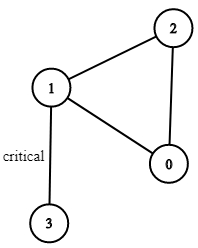Critical Connections in a Network
There are n servers numbered from 0 to n-1 connected by undirected server-to-server connections forming a network where connections[i] = [a, b] represents a connection between servers a and b. Any server can reach any other server directly or indirectly through the network.
A critical connection is a connection that, if removed, will make some server unable to reach some other server.
Return all critical connections in the network in any order.
Example 1:

Input: n = 4, connections = [[0,1],[1,2],[2,0],[1,3]]
Output: [[1,3]]
Explanation: [[3,1]] is also accepted.Constraints:
1 <= n <= 10^5n-1 <= connections.length <= 10^5connections[i][0] != connections[i][1]There are no repeated connections.
// An edge is a critical connection, if and only if it is not in a cycle.
// We record the timestamp that we visit each node.
// For each node, we check every neighbor except its parent and return a smallest timestamp in all its neighbors.
// If this timestamp is strictly less than the node's timestamp, we know that this node is somehow in a cycle.
// Otherwise, this edge from the parent to this node is a critical connection.
class Solution {
int T = 1;
public List<List<Integer>> criticalConnections(int n, List<List<Integer>> connections) {
// use a timestamp, for each node, check the samllest timestamp that can reach
// from the node
// construct the graph first
List<Integer>[] graph = new ArrayList[n];
for (int i = 0; i < n; i++)
graph[i] = new ArrayList<>();
for (List<Integer> conn : connections) {
graph[conn.get(0)].add(conn.get(1));
graph[conn.get(1)].add(conn.get(0));
}
// an array to save the timestamp that we meet a certain node
int[] timestamp = new int[n];
// for each node, we need to run dfs for it, and return the smallest timestamp
// in all its children except its parent
List<List<Integer>> criticalConns = new ArrayList<>();
dfs(graph, timestamp, 0, -1, criticalConns);
return criticalConns;
}
// return the minimum timestamp it ever visited in all the neighbors
private int dfs(List<Integer>[] graph, int[] timestamp, int currentNode, int parent,
List<List<Integer>> criticalConns) {
if (timestamp[currentNode] != 0)
return timestamp[currentNode];
timestamp[currentNode] = T++;
int minTimestamp = Integer.MAX_VALUE;
for (int neighbor : graph[currentNode]) {
if (neighbor == parent)
continue; // no need to check the parent
int neighborTimestamp = dfs(graph, timestamp, neighbor, currentNode, criticalConns);
minTimestamp = Math.min(minTimestamp, neighborTimestamp);
}
if (minTimestamp >= timestamp[currentNode])
if (parent >= 0)
criticalConns.add(Arrays.asList(parent, currentNode));
return Math.min(timestamp[currentNode], minTimestamp);
}
}Last updated